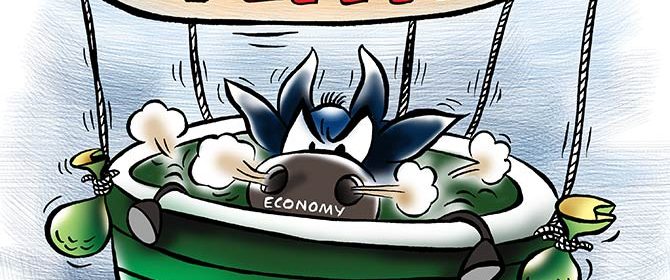Reeling under high prices? Finance ministry says it’s downside to growth

‘While intensification of fuel prices and broad-based domestic cost pass-through pressures is a downside risk, core inflation is expected to strengthen further as demand recovers to pre-Covid levels,’ the ministry said on Friday.
Illustration: Uttam Ghosh/Rediff.com.
The finance ministry on Friday flagged global and domestic inflation as a “downside risk” to India’s growth momentum.
“While global and domestic inflation pose some downside risks in the near term, continued policy support to bolster private investment and discretionary consumption, the key levers of India’s growth story, continues to be an absolute policy priority of the government,” said the ministry’s monthly economic review report for February.
The focus of the report was on the rising international oil prices hurting economic recovery and demand. “While intensification of fuel prices and broad-based domestic cost pass-through pressures is a downside risk, core inflation is expected to strengthen further as demand recovers to pre-Covid levels,” it said.
Petrol and diesel prices are at a historic high now as the government has not yet rolled back the taxes it levied when prices plummeted almost a year ago.
Citing the country’s consumer price index, the ministry said it had reached a 16-month low in January, validating the Reserve Bank stance of providing a growth push in the face of moderating inflation.
Core inflation at 5.5 per cent remained elevated, displaying persistence on account of price pressures in health, petrol, diesel, motor vehicles, transportation fares and recreation services. Double-digit inflation continued in prices of personal care services.
A buoyant rabi harvest and crop arrivals would keep cereal and onion inflation in check while edible oil inflation movements depend on moderation of global price pressures, according to the finmin report.
Covid-19 vaccination also finds a mention. The vaccination capacity has been ramped up by engaging 10,000 private hospitals under the Ayushman Bharat scheme and more than 600 private hospitals under the central government for the inoculation drive, it pointed out. Development of 18-20 vaccines in the country is also underway to provide further stimulus to the economy, according to the report.
The government expects the GDP growth in the fourth quarter to remain in the positive territory on the back of higher government expenditure, moderated contraction in private consumption and net exports emerging out of dismal retrenchment. In Q3, GDP grew at 0.4 per cent after two successive quarters of contraction. For the full FY21, GDP is seen contracting at (-)8%, according to government estimates.
Referring to economic recovery, it said the expansion of services activity since the beginning of 2021 was noteworthy as people have shown preference for enhanced mobility even at the risk of increasing the infection rate.
Source: Read Full Article

